Driving in France can be an exciting and convenient way to explore the beautiful countryside, vibrant cities, and scenic routes of in France and throughout mainland Europe.
However, for UK drivers, there are specific rules and regulations that must be followed to ensure a safe and legal journey.
This guide will provide everything you need to know about the essential items for your “Driving in France Kit,” as well as key tips to keep you compliant with French road laws.
Why You Need a Driving in France Kit
Driving in a foreign country comes with its own set of challenges and legal requirements. France, like many European countries, has strict rules about what must be carried in a vehicle at all times. Failing to comply with these regulations can result in on-the-spot fines or even more serious penalties.
The “Driving in France Kit” is not just about avoiding fines; it’s about ensuring your safety and that of your passengers. Many of the items required by French law are intended to help in emergencies or to improve visibility and safety on the roads.
Preparing this driving kit in advance of your journey ensures you are fully compliant with French road laws and helps make your driving experience smoother and more enjoyable.
About the Information Here
This post has been written using information from the Drive-France.com website. Drive-France is one of the foremost authorities on all things, driving in France related.
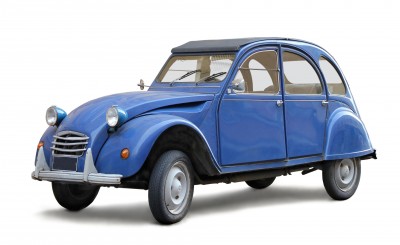
The “Driving in France Checklist” provided by Drive-France is probably the most comprehensive checklist you can find anywhere. Here we have taken (with permission) some of the salient points.

Essential Items for Your Driving in France Kit
To drive legally in France, UK drivers must have the following items in their vehicle. These are mandatory and can be easily acquired in the UK before your journey as part of a comprehensive European driving kit.
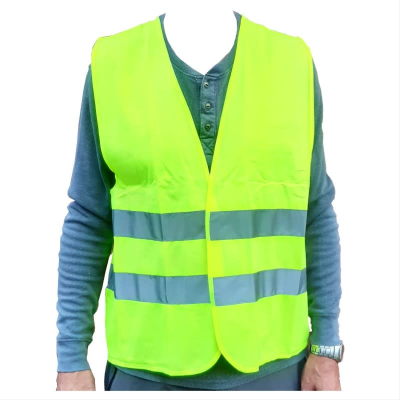
1. Reflective Jackets
- Requirement: Each passenger must have a reflective jacket, which should be kept within easy reach (inside the car, not in the boot).
- Purpose: To ensure visibility in case you need to exit the vehicle on the roadside, especially during breakdowns or accidents.
- Tip: Make sure the jackets meet the EN471 standard or an equivalent. This is often included in a complete European driving kit, ensuring you have a high visibility vest that meets the required standards.
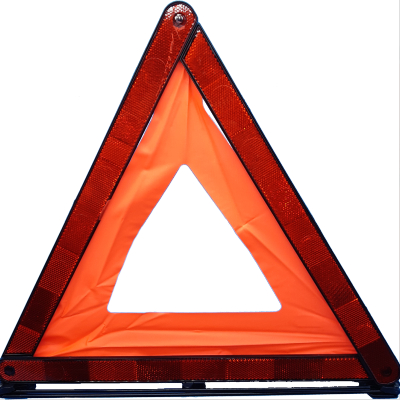
2. Warning Triangle
- Requirement: One warning triangle must be carried in your vehicle at all times.
- Purpose: To alert other drivers of your vehicle’s presence if you break down or are involved in an accident.
- Tip: Place the warning triangle at least 30 meters behind your vehicle on standard roads and 100 meters on motorways.

3. Breathalyzer Test Kits
- Optional: These are NOT compulsory anymore but the French drink driving laws are much stricter than the UK’s so it might be a good idea to take some with you.
- Purpose: To self-test your alcohol level before driving.
- Tip: Purchase NF-approved breathalyzer kits (the French standard) for compliance. Some driving kits include these, making it convenient to have all items in one package.
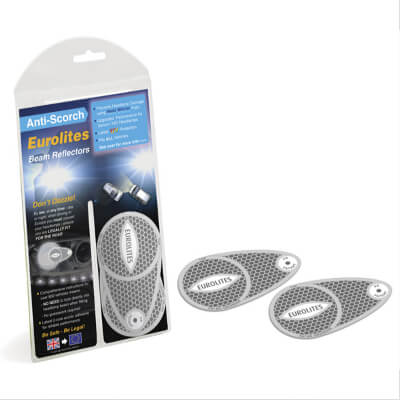
4. Headlamp Beam Deflectors
- Requirement: UK cars are designed for driving on the left, so your headlights will dazzle oncoming traffic when driving on the right. Beam deflectors are needed to adjust the direction of the light.
- Purpose: To avoid blinding other drivers with your headlights.
- Tip: Deflectors should be bought before you go so they can be fitted while you’re on the ferry or inside the Eurotunnel. Ensure they are part of your travel kit before setting off.
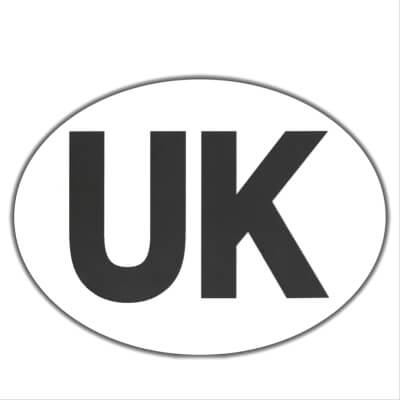
5. UK Sticker
- Requirement: If your car’s number plate does not include a UK identifier, you must have a full sized UK sticker on the back of your vehicle.
- Purpose: To identify your vehicle as being registered in the UK when driving abroad.
- Tip: Stickers are widely available, but make sure it is securely attached and visible. If you are towing a caravan, boat or similar you’ll need one on the trailer as well.

6. Spare Bulb Kit
- Requirement: While not mandatory, it is highly recommended to carry a spare bulb kit.
- Purpose: To replace any failed lights immediately, ensuring you remain visible and compliant with road safety laws. This is something else the French police are quite strict about.
- Tip: You can’t possibly take every bulb that your car has, so just buy a “Universal kit” at it will have most of the main ones you might need. Even when driving in the UK these may come in handy.

7. First Aid Kit
- Optional: A first aid kit is not a legal requirement in France, but it is strongly advised.
- Purpose: To be prepared for minor cuts and bruises.
- Tip: Include items like bandages, antiseptic wipes, and basic supplies. A good European driving kit often includes a compact first aid set.
Additional Recommended Items for Your Journey
While the above items are mandatory, there are additional items that are highly recommended to ensure a stress-free driving experience in France.
1. European Breakdown Cover
- Purpose: To provide assistance in case your car breaks down while driving in France. Without it, you may face high costs for roadside assistance and repairs.
- Tip: If you have breakdown cover for the UK, verify if your breakdown cover includes European assistance and understand what is covered under your policy. Companies like the AA, RAC and Green Flag European cover but I get mine from a specialist European Breakdown company.
Specialist European Breakdown Cover. For both single trip cover or an annual policy.
2. Insurance Green Card
- Purpose: The Green Card serves as proof of motor insurance coverage when driving abroad. While not always mandatory within the EU, having one can simplify dealings with local authorities.
- Tip: Contact your insurance provider well in advance of your trip to arrange for a Green Card if needed.

Read: Top Ten Motorcycle Trips in Europe
3. High Visibility Jacket for Motorcyclists
- Requirement: Motorcyclists are required to wear high visibility jackets if they need to stop on the roadside.
- Purpose: To increase visibility and safety on the roads.
- Tip: Keep the jacket easily accessible to avoid rummaging in bags during emergencies.
4. Maps or GPS with European Coverage
- Purpose: To navigate unfamiliar roads and avoid relying solely on mobile data, which may incur high roaming charges.
- Tip: Update your GPS maps or purchase a reliable map of France to guide you on your journey.
Important Legal and Safety Considerations
Driving in France involves more than just having the right kit. Understanding and adhering to local traffic laws is crucial to ensuring a safe and hassle-free trip. You should buy a Speed Converter if your speedo doesn’t show KPH.
1. Speed Limits
- Urban Areas: 50 km/h (31 mph).
- Rural Roads: 80-90 km/h (50-56 mph).
- Motorways: 130 km/h (81 mph) in dry conditions, reduced to 110 km/h (68 mph) in wet conditions.
- Tip: Be aware of variable speed limits and adjust according to weather conditions and signs. Not only does the top speed reduce in France if it’s raining, you must also put your headlights on.

2. Drink Driving Laws
- Limit: The legal blood alcohol limit is 0.05% (0.5 g/l), which is lower than the UK limit of 0.08% (0.8 g/l). For new drivers (with a license for less than three years), the limit is 0.02% (0.2 g/l).
- Tip: It’s best to avoid drinking altogether if you plan to drive.
3. Priority to the Right Rule
- Description: At certain intersections, vehicles coming from the right have priority unless otherwise indicated. This is known as “Priorité à droite” in France.
- Tip: Watch for signs indicating the right of way and be extra cautious in urban areas where this rule is more common.

4. Toll Roads
- Description: Many French motorways are toll roads. Payment can be made by card, cash, or electronic toll tags. Be prepared as the payment booth will be by your passenger window rather than the drivers side.
- Tip: Be prepared with a credit or debit card that is accepted in France, and consider getting a toll tag for faster, cashless transactions.
Tips for a Smooth Driving Experience in France
To further ensure your driving experience in France is as smooth as possible, here are some additional practical tips:
1. Plan Your Route in Advance
- Research your route and identify key stops, fuel stations, and rest areas.
- Be aware of any planned roadworks or closures that may affect your journey.
2. Check Your Car Before the Trip
- Ensure your car is in good working order, with recent servicing, correct fluid levels, and proper tyre pressure.
- Check that your lights are functioning correctly, especially after fitting beam deflectors.

3. Know How to Handle French Fuel Stations
- Most fuel stations in France accept card payments, but it’s advisable to carry some cash as well.
- Note that some rural or smaller stations may be unmanned and require prepayment with a card.
4. Stay Updated on Local Traffic Laws
- Regulations can vary by region, and temporary rules (e.g., for pollution control) may be in place.
- Always carry your driving license, proof of insurance, V5C logbook, and any other relevant documentation.
Conclusion
Driving in France as a UK driver requires careful preparation, but by assembling the right “Driving in France Kit” and understanding local driving laws, you can ensure a safe and enjoyable journey.
Before setting off, double-check that you have all the mandatory items, and consider the recommended extras for additional peace of mind. Stay vigilant, drive safely, and enjoy your time exploring the beautiful roads of France!
Whether it’s your first time driving abroad or you’re a seasoned traveler, being fully prepared with the right equipment and knowledge will help make your driving experience in France smooth and stress-free.
Safe travels!



